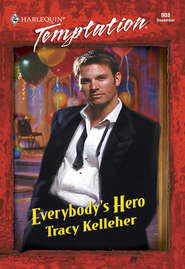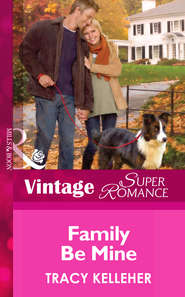По всем вопросам обращайтесь на: info@litportal.ru
(©) 2003-2025.
✖
On Common Ground
Автор
Год написания книги
2019
Настройки чтения
Размер шрифта
Высота строк
Поля
Noreen glanced at the alcohol but shook her head. “I probably shouldn’t. I have yoga first thing in the morning, and I like to feel fresh even before I start.” She glanced over at her daughter who was counting the door pulls on the cupboards and smiled. “Now what was I talking about before? Oh, yes, so there we were in Sustenance, and I started remembering how I grew up on a solid diet of fish and chips, and somehow I managed to survive. That’s when I decided to let Brigid have a hot-fudge sundae.”
Lilah noticed Brigid’s tutu fan over her head as she did a series of somersaults across the kitchen. Ah, yes, signs of a sugar high. Then she glanced back to Noreen, who was nervously strumming her fingers on the granite. “I take it you shared?” she asked.
“Why, yes, how did you know?” She became aware of her strumming. “I’m not usually this much of a motormouth, either. I swear on my grandmother’s Bible.” Then she hooked her arm through her bag. “Brigid, dear, why don’t you give your sister, Mimi, a kiss good-night before we go upstairs for your bath and a bedtime story?”
Brigid closed her eyes and fluttered her arms.
“Brigid O’Reilley Lodge. There will be no bedtime story if you don’t stop that and come now.” Noreen’s voice was firm.
The little girl opened her eyes and inhaled loudly. Then she swiveled on the toe of her Mary Janes and tromped inelegantly to Mimi.
Mimi abandoned her drink and bent down, awkwardly offering her cheek.
Brigid gave her a loud smack, then twirled around to Lilah. “You, too,” she announced. She walked over and raised her chin.
Lilah knelt down, her Achilles tendon smarting despite the infusion of gin, and reached out and gave the six-year-old a hug and kiss. She smelled of ketchup, hazelnuts and baby powder.
Brigid seemed very pleased. She looked at her mother. “I want her to read to me,” she said, pointing with her wand. “You’re beautiful, you know.”
Lilah blinked, amazed at the self-possessed child. “No, I didn’t know. Thank you.”
“But your sneakers are dirty. You should get Mommy to buy you new ones.”
Noreen shook her head. “The scourge of living in an affluent community like Grantham, I’m afraid.”
Lilah laughed. “We should all have such problems.” She looked seriously at Brigid. “I don’t need new ones. I can just wash these.”
“Your next lesson will be how to use the washing machine,” Mimi cracked.
Lilah glanced over. Mimi would never admit it, but Lilah thought she looked jealous. “And I’m sure your big sister, Mimi, will be happy to show you.”
“A worthy idea.” Noreen pried her daughter from Lilah. “Lilah will read to you another night, maybe. Tonight she’s seeing her best friend, Mimi, who she hasn’t seen in a long time.”
“I don’t mind,” Lilah said, painfully standing up.
Noreen clasped Brigid’s small hand. “Don’t be silly. She gets a story every night, so there are plenty of opportunities another time. In fact, because of her fantastic teacher, she won’t go to bed without one. It’s just amazing—to have someone who’s a real proponent of the Reggio Emilia model of early childhood education.”
Lilah and Mimi nodded with a complete lack of comprehension.
“I’m sure my mother would be very intrigued. She’s an elementary school principal,” Lilah said.
“How interesting,” Noreen said and she actually appeared to mean it.
“Anyway, in addition to understanding the importance of play, they read the most wonderful books, lots of the old classics. And then they start doing other things because of the reading. Like building castles after hearing chapters from The Wizard of Oz.”
Brigid wrapped an arm around one of her mother’s legs, clinging to the tight black leggings. The effects of the sugar seemed to be wearing off.
“Naturally there’re those parents who are skeptical because they’re so used to the emphasis on testing even at such a young age. It’s so competitive out there now.” Noreen ruffled Brigid’s fine hair, removing the tiara that was already slipping over one ear. “But I believe that the Reggio Emilia system works better in the long run, producing natural readers and ones with fewer social problems. And even the critics can’t deny that the teacher is good at picking up any learning disability.”
She shook her daughter’s hand playfully. “C’mon, munchkin. Time for bed. It’s late for a school night. You want to be up bright and early for Mr. B tomorrow, don’t you?”
“The early bird catches the worm. But I don’t like worms. I want to catch butterflies.”
“Well, your bird can catch butterflies,” her mother announced and guided her to the door.
“Wait a minute. This Mr. B?” Lilah called out.
“Mr. B, Tweedle B. Tweedle B and Tweedle Bum,” Brigid recited bowing her head back and forth. She pulled on her mother’s arm.
“That’s right, dear.” Noreen didn’t bother to correct her.
“How many six-year-olds know Lewis Carroll?” Mimi asked.
Lilah was almost convinced she detected some sisterly pride.
“Oh, that’s par for the course in Mr. B’s class,” Noreen said over her shoulder. “I’ll catch you later this weekend, then.” She waved.
Lilah pushed away from the island. “Before you go. One question—Brigid’s teacher? Mr. B? His full name wouldn’t be…”
“Justin Bigelow.” Mimi supplied the answer.
“How did you know?” Noreen bent down to pick up Brigid and carried her upstairs.
Left alone in the kitchen, Mimi lowered her chin and looked over her nose at Lilah. “You think she’s in love with him?”
“Brigid or Noreen?” Lilah asked.
“Either one. Both.”
Lilah pursed her lips. “Maybe I will have another drink.” She reached for her glass, and asked casually, a little too casually, “This love thing? You think it’s contagious?”
Mimi raised her eyebrows. “Why? You think you feel symptoms coming on?”
CHAPTER FIVE
“SO, TELL ME AGAIN WHO we’re picking the food up for?” Matt Brown asked as he opened the drinks case at Hoagie Palace. It was a Thursday evening, and the Grantham take-out institution was packed with high school and college students, and Matt, a local kid home for summer vacation after his freshman year at Yale, fit the profile. The smell of hot sauce, fried saturated fat and hormonal imbalance hung in the air.
“My half sister Mimi and a friend of hers from college,” Press Lodge explained as he held out money to the cashier. “She’s this woman named Lilah Evans—the head of a nonprofit in Africa or something.” As he waited for his change, he spoke to Angie, the woman behind the counter who owned the popular food spot with her husband, Sal. “Hey, Angie, I gotta satisfy the hoagie fix for the returning alums in the family. Otherwise they get ornery.”
“That’s what we count on,” Angie said with a laugh and passed the coins and bills to Press. “But if anyone gets ornery with you, hon, you send ’em to me. You’re like family.” Angie beamed over her shoulder at a wall of photographs. Press followed her gaze. Front and center was one from Press’s graduation from his prep school in Connecticut.
He’d invited Angie and Sal, never expecting they’d make the trip. Not only had they come, Sal had handed him an envelope on the side. “If you ever need anything, you know who to call,” Sal had offered with a swift handshake. “We’re proud of you.” Then he’d taken the picture of Angie with her arm around Press, a proud smile on her face, a dopey one on his. In the corner of the photo, slightly out of focus, stood his mother, glancing down at the Rolex on her wrist, probably checking how much time she had before her tennis match. His father—surprise, surprise—was nowhere in sight.
Press blew a kiss to Angie and led the way through the organized throng, asserting himself with one of his wide shoulders. His father had been disappointed that he hadn’t gone out for football at Grantham—he’d been heavily recruited. Just another disappointment in a long line, Press figured. Anyway, practices interfered with his job as a research assistant in his advisor’s lab, and he wasn’t about to give that up.
He waited outside of the store for Matt. The two of them had worked together at Apple Farm Country Club last summer, Matt manning the cash register in the pro shop and Press as a teaching pro for kids. Sometimes when they got in early and before the kids’ Swedish and French au pairs swarmed around Press, they’d go to the driving range and hit a bucket of balls. Matt was hopeless, but Press was a natural, hitting three hundred yards every time. It didn’t matter much because the point was really just to talk—about school, music, their parents, life. A bond had formed, and the two kept up on Facebook during the school year when Matt started Yale and Press finished up his junior year at Grantham.
Press watched as Matt stumbled out the front step and onto the sidewalk. He had tried to open his can of Arnold Palmer iced tea and walk at the same time. “Focus, Matt Brown, focus. How many times do I have to tell you,” he ribbed his friend.











